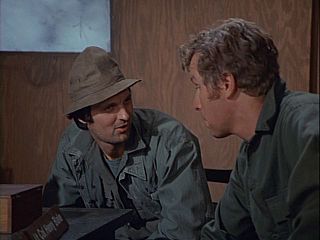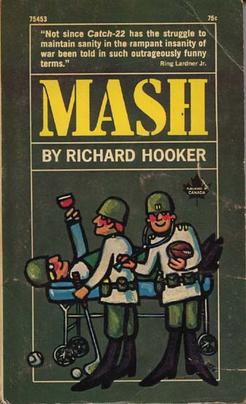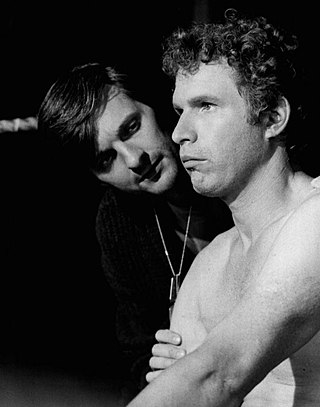Related Research Articles

The pilot episode of M*A*S*H, the first episode of the first season was broadcast on September 17, 1972, although the initial script was first written in November 1971. The episode was written by Larry Gelbart and directed by Gene Reynolds, who received the Directors Guild of America Award for it. It was also nominated for two Emmys for its direction and writing.
"Chief Surgeon Who?" is the fourth episode of the television series M*A*S*H.
"Yankee Doodle Doctor" is an episode of the television series M*A*S*H. It was the sixth episode broadcast and aired on October 22, 1972, and it was rerun April 8, 1973. It was written by Laurence Marks and directed by Lee Philips.
"Bananas, Crackers and Nuts" is an episode from M*A*S*H. It was the seventh episode broadcast and aired on November 5, 1972 and repeated April 22, 1973. It was written by Burt Styler and directed by Bruce Bilson.
"Cowboy" was the eighth episode of the M*A*S*H television series. Originally shown on November 12, 1972 and repeated May 6, 1973, it was written by Bob Klane and directed by Don Weis. It is the only first-season episode listed in TV Guide as a "classic episode".
"The Ringbanger" was the 16th episode of the first season of the TV series M*A*S*H. It originally aired on January 21, 1973.
"Sometimes You Hear the Bullet" is the 17th episode of the first season of the TV series M*A*S*H, originally airing on January 28, 1973. This is the first episode in which the medical staff failed to save a wounded soldier, and one of the first episodes of the series showing a member of the hospital staff truly affected by death.
"The Longjohn Flap" is the 19th episode of the first season of the TV series M*A*S*H. It originally aired on February 18, 1973, and was the first episode of M*A*S*H to be written by series star Alan Alda.
"Major Fred C. Dobbs" is the 22nd episode of the first season of the TV series M*A*S*H. It originally aired on March 11, 1973.

MASH: A Novel About Three Army Doctors is a 1968 novel written by Richard Hooker with the assistance of writer W.C. Heinz. It is notable as the foundation of the M*A*S*H franchise, which includes a 1970 feature film and a long-running TV series (1972–1983). The novel is about a fictional U.S. Mobile Army Surgical Hospital in Korea during the Korean War.
"To Market, to Market" is the second episode of M*A*S*H. It was first aired on September 24, 1972 and repeated on April 29, 1973. Like many other M*A*S*H episodes, this one parodies army bureaucracy.
"Adam's Ribs" is the eleventh episode of the third season of M*A*S*H, and fifty-ninth overall. The episode premiered November 26, 1974, on CBS.
"Radar's Report" was the 27th episode of M*A*S*H, and third of season two. The episode aired on September 29, 1973.
"For the Good of the Outfit" was the 28th episode of the television series M*A*S*H, the fourth episode of season two. The episode was aired on October 6, 1973.
"The Trial of Henry Blake" is episode 8 from season 2 of the TV series M*A*S*H.
"Deal Me Out" was the 37th episode of the M*A*S*H television series and the thirteenth of season two. The episode aired on December 8, 1973.
"The Consultant" is the 17th episode in the third season of the television series M*A*S*H. It originally aired on January 17, 1975. It was written by Robert Klane, from a story by Larry Gelbart, and was directed by Gene Reynolds.
"House Arrest" is the 18th episode in the third season of M*A*S*H. It originally broadcast on February 4, 1975.

"Requiem for a Lightweight" is the third episode of the television series M*A*S*H. It was first aired on October 1, 1972 and was repeated on December 31, 1972, the first episode of M*A*S*H to do so. In Watching M*A*S*H, Watching America, a sociological examination of M*A*S*H as an illustration of shifting American values in the 1970s and early 1980s, James H. Wittebols cites this episode as an example of the sexual humor which was common in early M*A*S*H episodes, but downplayed later in the program's history.
References
- ↑ Wittebols, James H. (2003). Watching M*A*S*H, Watching America. Jefferson, North Carolina: McFarland. pp. 161–166. ISBN 0-7864-1701-3 . Retrieved May 16, 2009.
- ↑ "Episode Guide". TV Guide. Retrieved 2009-05-15.
- ↑ "The Classic Sitcoms Guide: M*A*S*H". classicsitcoms.com. Archived from the original on 2011-07-23. Retrieved 2009-05-15.
- ↑ "M*A*S*H: Season One (Collector's Edition) (1972)". Digitallyobsessed.com. Archived from the original on 2011-06-13. Retrieved 2009-05-21.
- ↑ Reiss, David S. (1983). M*A*S*H: the exclusive, inside story of TV's most popular show. Bobbs-Merrill. ISBN 0-672-52656-5.